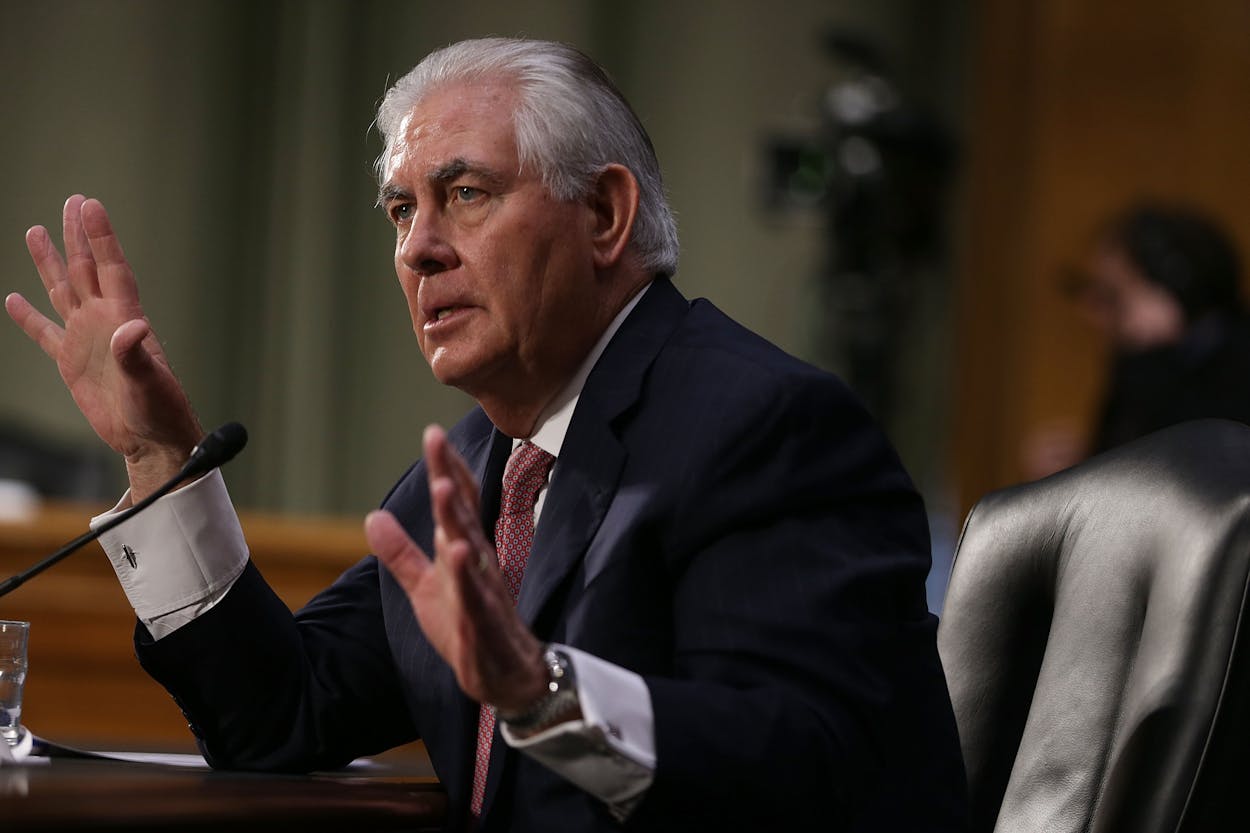New York Attorney General Eric Schneiderman said in a court filing on Friday that his office has documents showing Secretary of State Rex Tillerson knowingly misled investors on the cost impact of global warming when he was at the helm of Dallas-based oil giant Exxon Mobil, the Wall Street Journal first reported.
The filing alleges that from as early as 2010, Exxon misled investors about the company’s estimates of the cost that regulations on greenhouse gas emissions would have on its operations. “Exxon actually recognized that its secret, internal figures understated the degree to which Exxon was taking into account the risks of climate change regulations, and thus, were not as conservative as its representations to investors suggested when applied to the vast majority of projects emitting [greenhouse gases],” the filing says. “Nonetheless, as it admitted in an internal presentation in May 2014, Exxon continued to represent to investors and the public that it used the higher proxy cost reflected in its public disclosures. Exxon’s documents show that former Chairman and CEO Rex Tillerson was specifically informed of, and approved of, this inconsistency.”
The allegations come amid a two-year investigation by the New York Attorney General’s Office into Exxon’s disclosures to investors regarding global warming. The filing also asks the New York State court to force Exxon to release more documents and make witnesses available for the investigation, after previously accusing Exxon of refusing to provide emails from alias accounts used by Tillerson under the name “Wayne Tracker” and by current Exxon CEO Darren Woods, who used the the name “J.E. Gray,” according to the Journal. But apparently the documents the AG’s office already has show some pretty damning stuff. According to the filing, “that evidence suggests not only that Exxon’s public statements about its risk management practices were false and misleading, but also that Exxon may still be in the midst of perpetrating an ongoing fraudulent scheme on investors and the public.”
Exxon denied the new allegations, calling them “inaccurate and irresponsible,” according to the Journal. “ExxonMobil’s external statements have accurately described its use of a proxy cost of carbon, and the documents produced to the Attorney General make this fact unmistakably clear,” Exxon spokesman Scott Silvestri said in a statement. “We will respond fully to the Attorney General’s inaccurate and irresponsible allegations about proxy cost in our court filings.”
It remains to be seen whether Exxon’s denial will be enough to appease shareholders, many of who were already concerned about the company’s reporting habits. On Wednesday, the company’s shareholders gathered in Dallas, where 62 percent of them voted in favor of a proposal to force the company to submit annual reports to investors that show how the company will be affected by international efforts to reduce harmful greenhouse gas emissions.
This week has been particularly rough on the oil giant. One day after the shareholders meeting, President Donald Trump split from Exxon and a host of other big energy companies when he pulled the U.S. out of the Paris climate accord. Woods had pleaded with the president to stay, hoping Exxon could keep its seat at the table while the rest of the world makes decisions on how to reduce harmful emissions, implementing policies and regulations that would certainly impact the way Exxon does business. Tillerson too had been in favor of the U.S. remaining in the Paris agreement. But Trump called the Paris accord “unfair” for the U.S., and promised to try to renegotiate, though that does not appear possible. Immediately following Trump’s announcement, European nations collectively said the pact would not be changed, according to Reuters.
Exxon is also grappling with a federal lawsuit, which it filed in an attempt to stop the investigation by the New York Attorney General’s Office and a similar investigation by the Massachusetts Attorney General’s Office. The latest news out of that case wasn’t good for Exxon, either. The company suffered a major blow in March, when it lost home-court advantage after the presiding judge moved the case from a federal court in Dallas to New York.
- More About:
- Energy






